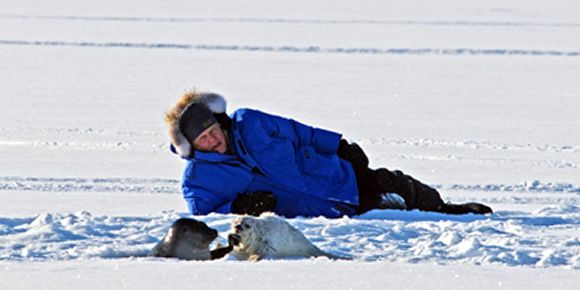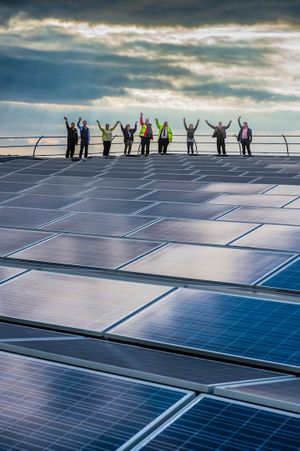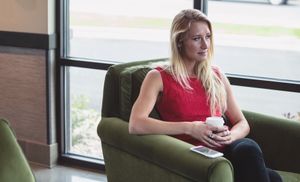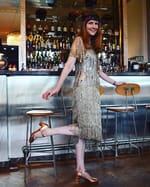Interview with Sir David Attenborough By Alison Jane Reid
Sir David Attenborough, broadcaster par excellence, naturalist, and our greatest living Englishman, is not himself. Attenborough has the builders in, at his pretty Strawberry Gothic cottage in Richmond, for what he calls ‘ necessary alterations.’ They are the politest, nicest builders I have ever encountered, so that isn’t the problem. Nor is it the fact that London has been burning, after three days and nights of rioting and nihilistic madness. No, Attenborough is very carefully thinking about Frozen Planet, the extraordinary series he narrates for the BBC on the polar regions and climate change, which is the jewel in the autumn schedules.
Going to the North Pole was an intellectual thrill, because of course there is nothing to see,” he tells me. “I am always amazed that anyone knows exactly where it is. You have to take astronomical surveys. I don’t know how Scott managed to take surveys at the South Pole and say, ‘ boys, we are not here yet, we have another three days to go’, that was quite an achievement.
Frozen Planet is like Harry Potter meets Lord of the Rings, only a thousand times more extraordinary, more magical. You can’t upstage nature. In this much- anticipated series, Attenborough takes us on a magic carpet ride through the hidden, snowy splendours of this most elusive of kingdoms. From the crystal caves of Mount Erebus, as alluring and awe-inspiring as any manmade cathedral – to witnessing a pod of killer whales smartly act in unison to rock a seal off the ice and into their waiting jaws.
The beauty and awe-inspiring power of the poles is constantly laid bare, and makes for riveting viewing. Then, Attenborough delivers his quiet polemic. “Just as we are finally getting to see and understand the poles for the first time, they are changing, possibly forever. What happens at the poles affects each and everyone one of us.”
When I first watched Frozen Planet for the purposes of this interview, I was disappointed that David didn’t seem more outraged, more angry, about the rate at which the ice is melting in the Arctic and Antarctic, and its implications for us. Then, I watched the first episode again and the penny dropped. I realised that the entire series is an astonishing, elegiac lament for a vanishing world. When Attenborough says the changes will affect each and every one of us, you know it is deadly serious, for he is never given to exaggeration.
An Elegiac Lament for a Vanishing World
Sitting in David’s elegant sitting room in Richmond, surrounded by sensuous artifacts and his beloved fossils from his celebrated global wanderings, I ask him if this is final plea for all of us to act and change they way we live?
“It is a plea,” he says, pausing for what seems a lifetime, before he continues.
“It is a plea to remember what we have. We can’t reverse the changes happening at the poles; there is no chance in hell of that. All I know is that if we don’t do anything, the outcome will be worse. All we can do, and it will take a huge effort my humanity to do to it, is to lessen our impact, and make things less bad than they would otherwise be.”
I have never seen Attenborough so angry. Is he optimistic that governments and people will act in time? “No!” I am not optimistic. There are some enlightened countries that are doing their best; but then, as you say, vested interests get in the way. Never in the history of humanity, have nations got together and said, ‘yes, we will do that.’ But then never before have we faced the global issues we are talking about.
“But nobody can be surprised that these international committees don’t produce agreement. We can’t even control what we do in the North Sea. We can’t even control fishing in the Atlantic. How do we think we can agree on the entire globe? How do you deal with it? I don’t know.”
Clearly, David had run out of patience with all the committees and the endless, empty rhetoric on climate change. In his own measured, civilized, rational, intellectual way, he is clearly imploring all of us to wake up and act before it is too late.
“It is not enough to change the way we live; we need to change our politics,” he says. “I wish people would stop talking about global warming; it is climate change that matters. Instead of becoming hotter, the air will become cooler, and many regions including Britain could become much colder.”
Britain in the Freezer!
Do you mean we could land up in the freezer?
“Yes! I’ve been say that for years! But the problem is that we can look back and see what happened to temperatures; but we still can’t look forward; it is still informed guess work.”
As many people who have watched and listened to Attenborough in recent years will know – he believes our biggest challenge is dealing with increasing population levels and the pressure this places on dwindling resources.
“What do you say to the kids today? It is not their fault that they were born,” he says. “The only way to deal with population is through economic improvement. It’s the only way, without being draconian, and without compelling individuals not to have children. We saw what happened in China, and that was terrible. So how do you deal with it? The only thing we know is that in every circumstance where women have the vote, where they are educated, and have the right to determine their own lives, and they are not dictated to by men; the birth rate drops like a stone, even in small states in India, like Kerala.
“So what the developed, wealthy part of the world has got to realise, and do, is to improve the conditions in Africa. But whether they will or not, I can’t pretend that I am optimistic.”
If that all sounds incredibly pessimistic, David is pragmatic and upbeat about our own remarkable ability to adapt and survive on this crowded, extraordinary planet.
“We survived the Dark Ages and the Sack of Rome,” he says, smiling now. “Human beings are the most adaptable species that has ever evolved, and unlike the dinosaurs, we build greenhouses! We are extremely inventive, and I have no doubt that we will find ways of coping with climate change and everything else. But we won’t survive in the numbers we are now, and not at this level of material comfort.”
It is at this point that David tells me that he loathes the idea of being seen as some kind of sage or prophet, and that he is wary too, and ‘fearful’ of making ‘doom-laden’ prophecies.
We Need to Reduce Consumption and Population to Avoid Catastrophe
“All I know is that we have to do our utmost to reduce the things that we are doing; that we have to do our utmost to reduce our consumption, and we have to reduce population. If we do both those things, we have a reasonable chance of surviving for another five hundred to a thousand years. But, if we don’t do any of those things, we are in for a real catastrophe.”
I don’t think I have ever felt quite so guilty or awkward about moving the conversation on to more cerebral matters. But, given that David is now in his ninth decade and seems to have more energy that many people half his age, and still retains that celebrated boyish wonder and appeal; how does he journey to the North Pole at eighty-five, and look so, forever young, and boyish?
What is his secret?
“I don’t feel it!” he says quickly, and very honestly. “One of the great things is people wanting you to do things. If you lie in bed in the morning and you feel creaky, and nobody cares tuppence whether you get up or not, that must be terrible. I know people my age who are getting cancer. It’s not virtue. I don’t know what it is; it is just luck. I certainly can’t pretend I run up and down stairs, or that I have ever really done any exercise; because I don’t.”
I suggest that perhaps it has more to do with high levels of happiness and fulfilment.
“Yes, that’s very true. It has a lot to do with that.”
I ask him if he has time for hobbies.
I play the piano, quite well, and I read. I’ve just finished a biography on John Piper, the landscape painter. He designed the window in Coventry Cathedral.”
For the record, Attenborough has a keen eye for collecting, from ceramics to the colourful, quite mesmerizing cubist paintings of John Craxton, of which there are several handsome and wonderfully realistic examples of birds on the sitting room walls; but he grows a little impatient with me, when I try and draw him out on his taste. “Look him up on Google!” he commands, his eyes twinkling. The last time I interviewed him, he told me he didn’t do email or the Internet!
But he does soften a little, and tells me that there is an exhibition of Craxton on at The Tate, which he enjoyed.
As our interview draws to a close, I ask him what he watches on television, given that he is one of the most watched people in the world.
David Loves Great Comedy, Including The Office
“I watch the news and documentaries; I don’t watch many series or reality television. I like comedy, but I’m afraid my tastes are rather dated, and stuck in the sixties. It’s an age thing. There just isn’t much that makes me laugh now. Though I did like The Office.”
“What about the new generation of presenters and cultural historians? While you concentrate on compelling facts, and telling a story, with the new presenters it is more about the cult of personality. Do you think that is a good thing?”
“I think a lot of programmes now are simply adventure programmes. I don’t mean that in a derogatory way. Gordon Buchanan did an extraordinary report on how you would track a bear. I admire him very much. You learn a lot about bears, and you learn a lot about Gordon, and that’s fine. There are many ways of killing a cat, as they say. It isn’t the way I do it, but it did make very good television. Today programme-making is about people and people like people. That doesn’t make it a bad thing, it is just different.”
While Frozen Planet captures the extraordinary beauty and majesty of nature, it all shows us bloodied, spent polar bears and a bison becoming lunch for a pack of hungry wolves. You don’t shy away from the showing the harshness and brutality of nature; do you think it is important not sugar coat animal behaviour?
“We are not in the business of producing fairy stories. I have always tried to show what it is. It goes back to Greek drama. How do you show Oedipus Rex putting out his eye? You have to do it in a way that in your imagination you can believe is real, without making people physically ill. As filmmakers, we strive for that balance constantly. If people saw what I had left on the cutting room floor, they would feel I have gone the other way.”
Finally, just as the doorbell goes, I succeed in making Sir David laugh.
You were once asked who your favourite mammal is, and you replied, ‘woman’.
“Ha, ha, I did say that.”
“So if you are our greatest living Englishman, who is your favourite leading lady?”
“Ha, ha, well, there are quite a lot of them! You suggest something.”
“Who is your favourite screen goddess?”
“I don’t go to the movies.”
“What about your brother Richard’s movies?”
“Well, I see them, if I get a free ticket! How about Ingrid Bergman? I like Casablanca; now that is a movie I do remember very well indeed.
Now, Miss Reid, I think we are done.”
As he gallantly escorts me to the front door, I give him a kiss on the cheek and tell him how he should always dress in pale blue cashmere, because it really suits him.
He laughs out loud and all the seriousness about the future of mankind and starving polar bears evaporates; because even prophets and national treasures need to laugh once in a while, and especially when they are so very busy saving the planet.
Alison Jane Reid Copyright November 2011
Download PDF of this David Attenborough Interview for Saga Magazine Published November 2011
Frozen Planet BBC1 9 pm Every Wednesday until December 7th, 2011












